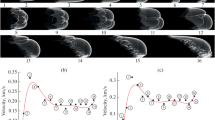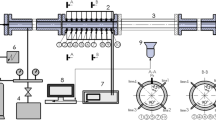Abstract.
Detailed observation of deflagration to detonation transition (DDT) is inherently difficult. This is primarily due to the stochastic nature of flame acceleration and shock formation processes that in most practical situations give rise to the conditions required for detonation to emerge. The present paper describes how shock tube techniques have been used to control the conditions required for the onset of detonation. The paper first outlines some initial experiments involving turbulent flame acceleration before concentrating on experiments in a reflected shock mode. To aid interpretation of the observations the paper also presents a simple gasdynamic analysis of particle trajectories and considers the various physical and chemical processes that could lead to the onset of detonation.
Similar content being viewed by others
Author information
Authors and Affiliations
Additional information
Received 27 November 2001 / Accepted 28 January 2002
Rights and permissions
About this article
Cite this article
Thomas, G., Bambrey, R. Some observations of the controlled generation and onset of detonation. Shock Waves 12, 13–21 (2002). https://doi.org/10.1007/s001930200132
Issue Date:
DOI: https://doi.org/10.1007/s001930200132




